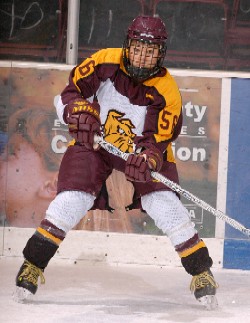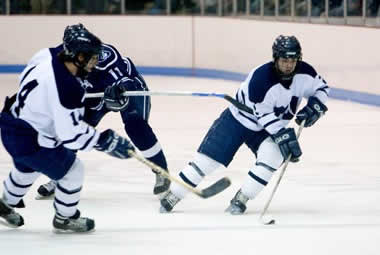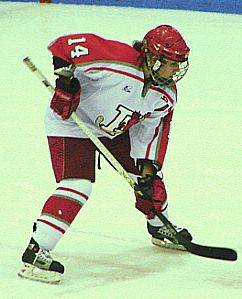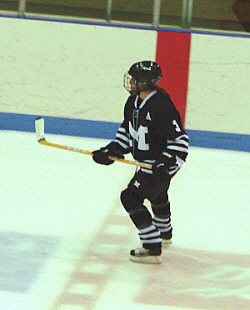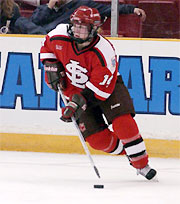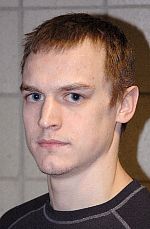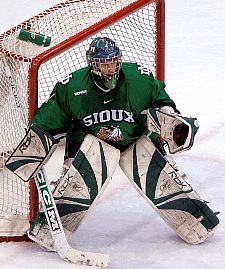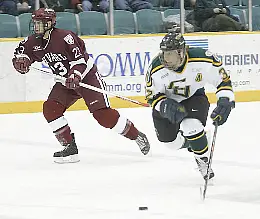It’s time once again to do what we like to call Bracketology — College Hockey Style. It’s our weekly look at how the NCAA tournament would wind up if the season ended today, and how it might end up after future results.
It’s a look into the possible thought processes behind selecting and seeding the NCAA tournament, and we’ll be bringing you a new one every week until we make our final picks before the field is announced.
Let’s dispense with the particulars, since we’ve beaten them into everyone’s heads. If you want to review them, just read the beginning of the Feb. 28 Bracketology to get your fix.
Here, then, are the top 16 of the current PairWise Rankings (PWR), with the bonus, as well as all conference tournament champions and number-one seeds in conference tournaments that are not in the Top 16 (through all games of March 13, 2007):
1 Minnesota
2 Notre Dame
3 St. Cloud
4 New Hampshire
5 Clarkson
6 Boston College
7 Boston University
8t North Dakota
8t Michigan
8t Michigan State
11 Massachusetts
12t St. Lawrence
12t Maine
14 Miami
15 Michigan Tech
16t Dartmouth
16t Denver
— Sacred Heart
— Alabama-Huntsville
Current number-one conference seeds and champions:
Atlantic Hockey: Sacred Heart
CHA: Alabama-Huntsville
CCHA: Notre Dame
ECACHL : St. Lawrence
Hockey East : New Hampshire
WCHA: Minnesota
Notes
• Bracketology assumes that the season has ended and there are no more games to be played; i.e., the NCAA Tournament starts tomorrow.
• The number-one seed in each tournament is the assumed champion of the tournament; therefore, that team gets an autobid to the NCAAs.
Step One
From the committee’s report, choose the 16 teams in the tournament.
We break ties in the PWR by looking at the individual comparisons among the tied teams, and add in Alabama-Huntsville and Sacred Heart.
From there, we can start looking at the bubble in a more detailed fashion.
The bubbles consist of North Dakota, Michigan and Michigan State at 8 and St. Lawrence and Maine at 12. The bubble at 16 is moot because Alabama-Huntsville has claimed a spot in the tournament.
Looking at the individual comparisons, North Dakota wins comparisons against both Michigan and Michigan State and Michigan wins the comparison with Michigan State.
At 12, SLU defeats Maine in the comparison.
Therefore the 16 teams in the tournament, in rank order, are:
1 Minnesota
2 Notre Dame
3 St. Cloud
4 New Hampshire
5 Clarkson
6 Boston College
7 Boston University
8 North Dakota
9 Michigan
10 Michigan State
11 Massachusetts
12 St. Lawrence
13 Maine
14 Miami
15 Sacred Heart
16 Alabama-Huntsville
Step Two
Now it’s time to assign the seeds.
No. 1 Seeds – Minnesota, Notre Dame, St. Cloud, New Hampshire
No. 2 Seeds – Clarkson, Boston College, Boston University, North Dakota
No. 3 Seeds – Michigan, Michigan State, Massachusetts, St. Lawrence
No. 4 Seeds – Maine, Miami, Sacred Heart, Alabama-Huntsville
Step Three
Place the No. 1 seeds in regionals. Because New Hampshire is hosting a regional, the Wildcats are placed first. Following the guidelines, we now place the other No. 1 seeds based on proximity to the regional sites
No. 4 New Hampshire is placed in the Northeast Regional in Manchester.
No. 1 Minnesota is placed in the Midwest Regional in Grand Rapids.
No. 2 Notre Dame is placed in the East Regional in Rochester.
No. 3 St. Cloud is placed in the West Regional in Denver.
Step Four
Now we place the other 12 teams so as to avoid intraconference matchups if possible.
Begin by filling in each bracket by banding groups. Remember that teams are not assigned to the regional closest to their campus sites by ranking order within the banding (unless you are a host school, in which case you must be assigned to your home regional).
If this is the case, as it was last year, then the committee should seed so that the quarterfinals are seeded such that the four regional championships are played by No. 1 v. No. 8, No. 2 v. No. 7, No. 3 v. No. 6 and No. 4 v. No. 5.
So therefore:
No. 2 Seeds
No. 5 Clarkson is placed in No. 4 New Hampshire’s Regional, the Northeast Regional.
No. 6 Boston College is placed in No. 3 St. Cloud’s Regional, the West Regional.
No. 7 Boston University is placed in No. 2 Notre Dame’s Regional, the East Regional.
No. 8 North Dakota is placed in No. 1 Minnesota’s Regional, the Midwest Regional.
No. 3 Seeds
Our bracketing system has one Regional containing seeds 1, 8, 9, and 16, another with 2, 7, 10, 15, another with 3, 6, 11, 14 and another with 4, 5, 12 and 13.
Therefore:
No. 9 Michigan is placed in No. 8 North Dakota’s Regional, the Midwest Regional.
No. 10 Michigan State is placed in No. 7 Boston University’s Regional, the East Regional.
No. 11 Massachusetts is placed in No. 6 Boston College’s Regional, the West Regional.
No. 12 St. Lawrence is placed in No. 5 Clarkson’s Regional, the Northeast Regional.
No. 4 Seeds
One more time, taking No. 16 v. No. 1, No. 15 v. No. 2, etc.
No. 16 Alabama-Huntsville is sent to Minnesota’s Regional, the Midwest Regional.
No. 15 Sacred Heart is sent to Notre Dame’s Regional, the East Regional.
No. 14 Miami is sent to St. Cloud’s Regional, the West Regional.
No. 13 Maine is sent to New Hampshire’s Regional, the Northeast Regional.
The brackets as we have set them up:
West Regional:
Miami vs. St. Cloud
Massachusetts vs. Boston College
Midwest Regional:
Alabama-Huntsville vs. Minnesota
Michigan vs. North Dakota
East Regional:
Sacred Heart vs. Notre Dame
Michigan State vs. Boston University
Northeast Regional:
Maine vs. New Hampshire
St. Lawrence vs. Clarkson
Our first concern is avoiding intraconference matchups. We have three of them.
We have to move Maine out of the Northeast, so we swap the Black Bears with Miami.
Now we have to move St. Lawrence and Massachusetts. We just swap the two.
So the tournament is now fixed.
West Regional:
Maine vs. St. Cloud
St. Lawrence vs. Boston College
Midwest Regional:
Alabama-Huntsville vs. Minnesota
Michigan vs. North Dakota
East Regional:
Sacred Heart vs. Notre Dame
Michigan State vs. Boston University
Northeast Regional:
Miami vs. New Hampshire
Massachusetts vs. Clarkson
Bracketing the Frozen Four, if all four number-one seeds advance, then the top overall seed plays the No. 4 overall, and No. 2 plays No. 3. Therefore, the winners of the Midwest and Northeast Regionals face each other in one semifinal (Minnesota and New Hampshire’s brackets), while the winners of the West and East Regionals (St. Cloud and Notre Dame’s brackets) play the other semifinal.
What Do We Know So Far?
Well, let’s take a look at the PairWise and we can draw some conclusions using both logic and running scenarios through our PairWise Predictor.
Teams That Can Look Forward To The Dance
A total of nine teams have punched their tickets, according to my calculations.
Those teams are Minnesota, Notre Dame, St. Cloud, New Hampshire, Clarkson, Boston College, Boston University, Michigan and Alabama-Huntsville.
Teams That Are, Or Can Be, TUCs That Must Wait Until Next Year
These teams, while they are now or can be TUCs, are done with their seasons: Colorado College, Vermont, Cornell, Nebraska-Omaha and RIT.
Teams That Must Win Their Conference Tournaments To Get In
These teams need to skate away with their conference trophies this weekend in order to get in: Wisconsin, Quinnipiac, Lake Superior, Sacred Heart, Army, Connecticut and Air Force.
Which Brings Us To The Bubble
You’ve got it, we’re now at the bubble, the place you really don’t want to be because anything can happen. It’s even worse when you can’t do a thing about your position by your own volition.
The teams on the bubble are North Dakota, Michigan State, Massachusetts, St. Lawrence, Maine, Miami, Michigan Tech, Dartmouth and Denver.
Nine teams battling for six spots, and perhaps only three spots should Wisconsin, Lake Superior and Quinnipiac all win their tournaments.
Let’s go into the bubble in detail, shall we?
Just When You Thought It Was Safe
For those of you who thought that North Dakota and Michigan State, in a tie for eighth in the PairWise, were locks for the tournament, think again.
While it is true that North Dakota is almost a lock, Michigan State, on the other hand, is not.
For North Dakota, it’s pretty simple: win one game and you are in. Doesn’t matter if it’s against St. Cloud in the semifinal or against Wisconsin/Michigan Tech/Minnesota in the third-place game. One win and you’re in. Pretty simple.
But — and there always is a but — North Dakota can be put out of the tournament.
Using our PairWise Predictor, put in these results:
CCHA: Lake Superior defeats Michigan State in the championship while Michigan defeats Notre Dame in the third-place game.
ECACHL: St. Lawrence defeats Dartmouth in the championship while Clarkson defeats Quinnipiac in the third-place game.
Hockey East: Massachusetts defeats either Boston College or Boston University in the championship.
WCHA: Michigan Tech defeats Wisconsin in the play-in, then defeats Minnesota and St. Cloud. Then Minnesota defeats North Dakota in the third-place game.
Atlantic Hockey: Connecticut or Army defeats Air Force in the championship.
Yup, North Dakota is out, despite being 13th overall in the PairWise because of four automatic bids beneath the Fighting Sioux. Granted, a far-fetched scenario, but North Dakota is out here.
Riding The Swing
As for Michigan State, the Spartans are in a real precarious position. I label them as one of two teams who have the most to lose this weekend. The other is St. Lawrence.
Michigan State, tied for eighth in the PairWise, could be in real trouble should it lose two games this weekend. Even one win might not be enough. The Spartans are affected by a lot of things and there are many scenarios that put them in with no wins or one win. The one thing in the favor of the Spartans — if all the favorites win every game and Michigan State loses two, the Spartans are in.
St. Lawrence is almost in the same position, but with fewer swings towards the positive should it only win one game. Winning one game would really put the Saints on the bubble, but losing two games will put St. Lawrence out of the tournament.
So, in my mind, these two teams have the most to lose by losing two games.
I’ve Fallen And I Might Not Get Up
We put Denver, Maine and Miami in this category. These teams faltered last weekend and now can only sit back and watch to see what develops.
All hope looks lost for Denver, but that’s not the case. In fact, there are a few key things that can happen.
Michigan State must lose two games. Dartmouth must also lose two games.
In addition, Notre Dame must then defeat Michigan in the CCHA championship and Clarkson must win the ECACHL.
But the biggest key, Wisconsin must, and it’s a huge must, defeat Michigan Tech on Thursday night. If that doesn’t happen, Denver’s season is over.
So here’s the rundown using the PairWise Predictor:
CCHA: Michigan State loses two games while Notre Dame wins the CCHA.
ECACHL: Dartmouth loses two games while Clarkson wins the championship.
WCHA: Wisconsin must defeat Michigan Tech, then St. Cloud must win the WCHA.
Hockey East and Atlantic Hockey: It doesn’t matter what happens there.
So if you’re a Pioneer fan, you have a big interest in the Wisconsin-Michigan Tech game on Thursday as you do if you are a Badger or Husky fan.
There are other scenarios that get Denver in, for example Dartmouth only losing one game, but the Wisconsin win is a must.
Or is it?
Astute readers have pointed out that Denver can get in even with a Michigan Tech victory over Wisconsin on Thursday.
Here’s how:
CCHA: Notre Dame wins the CCHA over Michigan and Lake Superior takes third
ECACHL: Clarkson defeats Quinnipiac for the title and Dartmouth downs St. Lawrence for third
Hockey East: New Hampshire defeats Boston College
Atlantic Hockey: Air Force defeats Army
WCHA: Michigan Tech wins the WCHA over North Dakota and Minnesota takes third place
So there you go, more hope for Pioneer fans!
Now let’s look at Maine and Miami. Maine is in a better position than Miami, mainly because Maine is propped up by its two quality wins, giving it a .006 boost in its RPI. But again, when you’re not playing, teams can pass you with wins.
So for Maine and Miami, you want the other bubble teams to lose. Should enough of them lose, you’re in the tournament.
Not A Minute More
Massachusetts is also one of those teams that pretty much rides it out. The chances of the Minutemen making the tournament are very high. Most scenarios have them in, but with a semifinal loss, they take a chance that they are out.
It’s pretty simple for the Minutemen: win a game and you’re in. Lose the semifinal and your chances are still good, but you have to wait and see.
In Or Out? Not Until The Final Buzzer
Well, we’re down to Michigan Tech and Dartmouth on the bubble. These two teams are interesting in the fact that wins can still equate to not making the tournament.
What do I mean? Well if Michigan Tech wins two games in the WCHA tournament, the Huskies can still be left out of the NCAAs. If Dartmouth wins one game in the ECACHL tournament, it can still be left out of nationals.
Conversely, if Michigan Tech loses the play-in game, it can still get in. Dartmouth, by losing two games, can not get in, though.
Now, getting Michigan Tech in with two wins is not a problem. A lot of scenarios to do that, but to leave the Huskies out with two wins — yes, it can happen.
CCHA: Lake Superior wins the CCHA over Michigan State and Michigan defeats Notre dame in the third-place game.
ECACHL: St. Lawrence defeats Clarkson for the title while Dartmouth takes third over Quinnipiac.
Hockey East: Massachusetts defeats Boston University for the championship.
Atlantic Hockey: Sacred Heart defeats Connecticut for the championship.
WCHA: Michigan Tech defeats Wisconsin, then Minnesota, but loses to St. Cloud in the championship and Minnesota defeats North Dakota in the third-place game.
And Michigan Tech is out of the tournament, with a 14th-place finish in the PairWise, but with three autobids behind the Huskies, thus taking their spot.
So, as you can see, while Michigan Tech may win two games this coming weekend, it does not guarantee a spot in the tournament.
As for Dartmouth, winning one game may not be enough to get it into the tournament, but there is also the possibility that it can. Not only is there that possibility, but it can also occur if Dartmouth loses its semifinal game to Clarkson.
Yes, folks, scratch your heads.
Here’s what has to happen:
CCHA: Notre Dame defeats Michigan for the title and Lake Superior takes third place.
Hockey East: Massachusetts defeats Boston College for the title.
WCHA: St. Cloud defeats Minnesota for the title, Wisconsin defeats Michigan Tech on Thursday and Wisconsin takes third place.
Atlantic Hockey: Sacred Heart defeats Connecticut.
ECACHL: Dartmouth wins third place by defeating St. Lawrence while Clarkson defeats Quinnipiac for the title.
Dartmouth winds up in a three-way tie for 14th, which is broken by the RPI tiebreaker, giving it the win over Denver and Michigan Tech. Last team into the tournament.
So Dartmouth, despite losing its semifinal, is in the tournament with one win, that coming in the third-place game.
The keys for Dartmouth appear to be Sacred Heart remaining a TUC, Wisconsin winning two games, and the fact that it can lose to Clarkson, but must defeat St. Lawrence in the third-place game. A third-place win over Quinnipiac will not get the Big Green into the tournament in the same scenario.
What Have We Learned?
We’ve learned a few things here. There are nine definitive locks for the NCAA tournament, including UAH, which is already in with the CHA autobid.
There is a huge bubble with varying degrees of success for getting into the NCAA tournament.
Weird things can happen with the numbers.
What appeared to be a certainty may or may not be.
Welcome to the wonderful world of the PairWise.
Part II of Bracketology will come Wednesday, when we’ll take a look at some odd scenarios and interesting possibilities that may arise after this weekend’s results.

